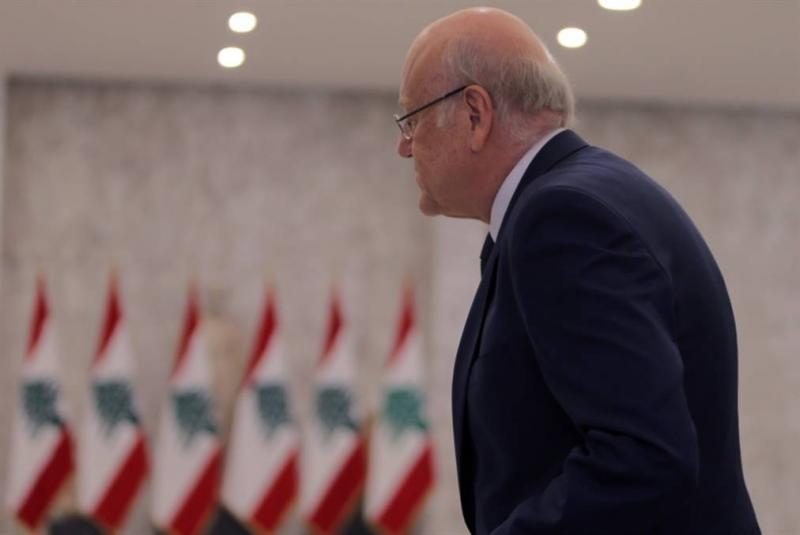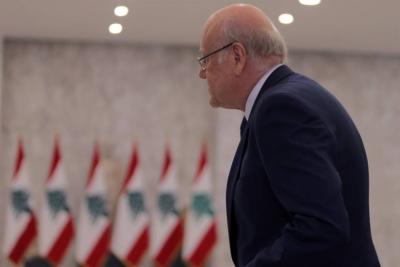To the stage of formation where the cooks abound and the cooking formulas burn before the void sits on the throne in Baabda. The methods of obstruction seem to have been exhausted to the last breath, prompting the designated Prime Minister Najib Mikati to tell journalists, "Move everything to Rabieh." With the timing sliced and the accumulated obstruction, the fronts continue to silently blaze until the regional vision becomes clear with the completion of the successive deadlines.
Mikati in Baabda today presented the file of forming the government, the political event where horizons remain blocked at this moment with continued conciliatory efforts to try to achieve a breakthrough before October 31. In this context, President Michel Aoun received the designated Prime Minister Najib Mikati at the Baabda Palace at 9:45 AM and discussed the general situation in the country and the issue of forming the government. After the meeting, President Mikati did not make any statement, but when asked if he still intends to spend the night at the Baabda Palace until the government is formed, he replied, "Move everything to Rabieh. There is no place to sleep."
Aoun and the single criterion are not far away. Aoun asserted that applying unified criteria in forming the government is the correct entry point for producing an effective government capable of managing the country's affairs. He stated in a chat with accredited journalists at the palace that what is currently happening in government formation contradicts the principle of unified criteria, as the parties participating in the government nominate their ministers themselves. When the "Free Patriotic Movement" (FPM) comes to nominate, they insist on intervention and choosing the ministers instead of the concerned political entity, which is unnatural and unacceptable. He remarked, “When each team wants to choose its ministers, the others must agree to adopt a single criterion for everyone without objection.”
Regarding the powers of the current government in the event of presidential vacancy, the President clarified that the government would have diminished powers and thus could not fully exercise the powers of the President. He stated, “The solution to matters is very simple, and we asked President Mikati today to treat everyone equally in the formation process and to return in the evening to Baabda to issue the decrees.” In response to a question about setting a new date for the Lebanese delegation's visit to Syria, President Aoun confirmed that the Syrian ambassador made a statement regarding this matter, affirming that a new date will be set later.
On his part, the Director-General of General Security, Major General Ibrahim, announced that "despite everything said, work continues in attempts to form the government."
On the presidential dialogue front, it seems that elections within the timeframes have become almost impossible amid expectations that the Speaker of the Parliament will not convene new sessions until he calls for a dialogue aimed at agreeing on a candidate's name.
Regarding the Taif Agreement, MPs, including Ashraf Rifi, Rami Fanj, Bilal Al-Hashimi, Mohammad Suleiman, Imad Al-Hout, Nabil Badr, Abdulaziz Al-Samad, Yassin Yassin, Waddah Al-Saadek, Ahmad Al-Khair, Walid Al-Baqarini, Ihab Matar, and Abdul Rahman Al-Bazari, met for a dinner at the house of MP Fouad Makhzoumi. The fourteen MPs emphasized their commitment to the Taif Agreement and its full application while affirming Lebanon's sovereignty, independence, and Arab identity. They agreed to work together to assist our people in various regions in complete state absence and stressed cooperation to improve the conditions of our people, especially concerning humanitarian and social issues, and achieving justice amid the complete collapse of state institutions and the absence of guaranteeing institutions.
From the Saudi side, the Saudi Embassy invited all MPs who participated in the Taif to attend the conference "Taif 33: The National Covenant of Lebanon" on November 5 at the UNESCO Palace. Political sources noted that this Saudi invitation serves as a reminder of the content of Taif, particularly the parts that have yet to be implemented regarding the implementation of reforms and limiting arms in the hands of legitimate Lebanese authorities, considering that holding the conference at this specific time signals to those calling for dialogue aimed at amending Taif that the solution is to implement Taif in its entirety, and then there would be no need for dialogues or alternative agreements.
On another front, attention turns to the arrival of American mediator Amos Hochstein to Beirut in the coming hours, preparing for the signing of the border demarcation agreement between Lebanon and Israel in Naqoura. The day before his arrival, Prime Minister Mikati met with U.S. Ambassador Dorothy Shea.
Meanwhile, the maritime border demarcation file between Lebanon and Syria continues to evolve following Syria's cancellation of the planned visit by the Lebanese delegation tomorrow, according to Baabda. In this context, President Aoun received the Syrian Ambassador Ali Abdul Karim Ali, who was bidding farewell due to the end of his diplomatic mission in Lebanon, granting him the Order of the Cedar from the rank of Grand Officer in appreciation of his efforts to enhance and develop Lebanese-Syrian relations in all fields.
Ali was asked about Damascus's refusal to receive the Lebanese delegation to discuss the issue of maritime border demarcation between the two countries and the timing of commencing bilateral talks regarding this, especially in light of the Treaty of Brotherhood, Cooperation, and Coordination between them, in addition to the issue of the return of refugees. He responded, “President Aoun called the Syrian president four days ago, and I received a call. That day, there was some confusion in the communication, and I later learned from the President Elias Bou Saab that there was thought about sending a delegation chaired by him to Damascus after the presidents' call. I told him to send us a letter to address it with the Ministry of Foreign Affairs, and I will call them to inform them that you will send this letter. I received the letter late on Sunday night because it was initially set for Thursday but changed to Wednesday. I told them that we still wanted a formal address so that ministers and officials in Syria could schedule the times according to their commitments. After the letter reached us late and the timing had not been set or discussed, it was announced from Lebanon that the delegation would head to Damascus on Wednesday. Thus, the response came that the timing was not canceled but would be arranged later, because when the timing was set for Wednesday, Syria’s schedule was fully booked with prior commitments."
As for the refugee file, Ali added, "Syria has spared no effort or opportunity to facilitate the return of refugees."
**Return is a National Duty**
Not far away, on the eve of a convoy scheduled to return Syrian refugees from Lebanon to their homeland tomorrow, Major General Ibrahim confirmed at a press conference held at the General Security Directorate that "the refugee file is a national and sovereign issue," considering that "their return to their homeland is a national duty that we must fulfill." He stated, "We have only received welcome and transparency from the Syrian side in handling the return of Syrian refugees." He observed that "the refugee issue has negative repercussions at all levels, and therefore it must be addressed, and Lebanon rejects the way it is being dealt with by many, especially humanitarian organizations and others claiming humanity that try to impose their will on us." He stated, "We will not submit to pressures because the interest of the Lebanese people comes first and foremost, and we will not force any refugee to return; this is our principle, and we strive to alleviate the burden on Lebanon." Major General Ibrahim clarified that there are currently 2,080,000 Syrian refugees in Lebanon, with about 540,000 having returned voluntarily to their homeland since the start of the plan in 2017.
**Price Declines and the Dollar**
Economically, the Prime Minister signed the Bank Secrecy Law as reported by the Presidency of the Parliament and referred it to the Presidency of the Republic. Fuel prices also recorded further declines today coinciding with the implementation of Banque du Liban's decision to sell the dollar exclusively, which contributed to reducing its ceiling.
**Reforms Remain Distant**
Additionally, the Vice President of the World Bank for the Middle East and North Africa, Farid Belhaj, in response to a question about the World Bank's financing for gas and electricity procurement from Egypt and Jordan, stated that reforms in the electricity sector are still far off. He added, "There are important reforms that the Lebanese state must undertake... when we reach a level of competence that allows us to look positively at the possibility of moving forward in supporting this area, we are ready to provide support, but these reforms are still distant today." He also expressed the Bank's readiness to provide significant funding for the Lebanese people ranging from $300 to $500 million, earmarked for social coverage issues.
Belhaj's remarks came from the government palace, where he met with Prime Minister Mikati. During the meeting, they discussed World Bank projects in Lebanon. The delegation also visited the Speaker of the Parliament and Minister of Finance, Youssef Khalil, where he said following the meeting, "We discussed all the projects that the World Bank is working on and financing, particularly developmental projects, and focused on agricultural projects, especially with the general trend towards strengthening productive sectors capable of consolidating the economic structure and enhancing its yield, especially for families engaged in agricultural activities." He emphasized "the importance of creating opportunities for small projects that make communities less dependent on social assistance that binds them to the interests of donor parties."




